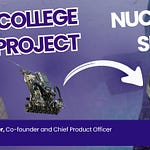SOF Week Pt. 1: A Tale of Three Defense Tech Startups
In this special edition of Crossing the Valley, we sit down with three promising defense technology companies ahead of their trip to SOF Week—one of the defense industry's premier events. Each company represents a different stage in the journey across the "valley of death" from concept to production, providing valuable insights for founders navigating the defense ecosystem.
About Edgerunner AI
Company Overview: Edgerunner AI is building domain-specific AI agents for warfighters that can operate without internet connectivity. Their technology enables military personnel to access ChatGPT-like capabilities that are tailored to their specific military occupational specialty (MOS), all while functioning in disconnected, degraded, intermittent, and limited bandwidth (DDIL) environments.
Founders:
Tyler Saltsman: Former Army logistician who served in Operation Atlantic Resolve. Previously at AWS where he first encountered Stability AI, helping to build their infrastructure before eventually joining them.
Colton Malkerson: Former Capitol Hill staffer for Speakers Boehner and Ryan, Stanford Business School graduate, and held positions at AWS and Stability AI.
Company Stage: Edgerunner AI has secured a CRADA (Cooperative Research and Development Agreement) with the Air Force Research Lab (AFRL) to power NIPR GPT. They recently closed their Series A funding (announced during SOF Week) and partnered with Second Front Systems. The company is less than a year old.
About Aurum Systems
Company Overview: Aurum Systems is developing the Atlas platform, designed to transform existing UAVs into independent intelligence, surveillance, reconnaissance, and targeting assets. Their software works completely at the edge and in the field, enabling operators to complete missions autonomously with minimal input.
Founders:
Jason Ashton: Founder and CEO with a background in robotics and self-driving technology.
Myles Spencer: Founder and CTO with product development experience at Google (YouTube's data warehouse) and Wayfair.
Company Stage: Aurum is approximately one year old, having raised a small angel round in September 2023. They recently demonstrated their technology publicly for the first time at the Avon Park Air Force Range for US SOCOM. They currently operate as a two-person team.
About Distributed Spectrum
Company Overview: Distributed Spectrum focuses on helping warfighters understand what's happening across the radio spectrum. Their technology adds intelligent software to existing hardware systems, enabling both trained experts and frontline operators to identify adversary communications and detect jamming without requiring expensive equipment or specialized training.
Founders:
Alex Wulff: Co-founder and CEO with a background in electrical engineering and a deep fascination with radio waves. Started the company with Ben Harpe (COO) and Isaac Struhl (CTO) while in college at Harvard.
Company Stage: Approximately 4.5 years since founding, with significant momentum since 2022 after graduation. They've raised a Series A round of $25 million, secured over $7 million in DoD contracts, and their RF sensing platform is already deployed in Ukraine and with U.S. special operators. The company currently has 16 employees.
About our Advisors
Dave Rolen is a combat developer for US Army Special Operations Command. He identifies, captures, and develops resourcing strategies for emerging requirements and Program Objective Memorandum (POM) products for key emerging capabilities.
Scott Moore is a recently retired Green Beret, most recently serving as the R&D NCOIC, and previously Director of Operations with the 3rd Special Forces Group. He’s now with SBIR Advisors and brings a wealth of recent insider knowledge after many years as the target customer and planning industry engagement events.
Key Takeaways:
Relationship-building trumps booth presence: All three companies prioritize strategic conversations over static displays. As Alex from Distributed Spectrum noted, "The Department of Defense and Government Business is really all a relationship game." Building trust through face-to-face interactions is essential.
Target the right stakeholders: Understanding who makes decisions at different levels is crucial. Scott Moore (retired Green Beret) advised: "The guy you really need to be talking to is that end user who's at the edge with the problem and then finding a champion to push that along."
Flexible scheduling maximizes opportunities: While pre-planning key meetings is important, leaving room for spontaneous connections often yields the best results. Myles from Aurum described their approach as "plan ahead, but also be flexible."
Education and evangelism are necessary: When introducing novel technology, focus on helping stakeholders understand what's possible. Tyler from Edgerunner explained: "A lot of folks don't know what we build is possible... it's sort of out of science fiction."
Partner with other startups: Collaboration can amplify reach and impact. Edgerunner's partnership with Second Front Systems demonstrates how complementary capabilities can create more comprehensive solutions for defense customers.
These insights highlight that successfully crossing the valley of death in defense tech requires more than superior technology—it demands strategic relationship building, understanding the acquisition ecosystem, and presenting solutions that address operators' immediate needs while being flexible enough to evolve with feedback.
To hear how the show went, tune in next week for Part II of this special episode!
For more about the companies:
Aurum Systems: https://aurum.systems/
Distributed Spectrum: https://www.distributedspectrum.com/
EdgeRunner AI: https://www.edgerunnerai.com/










